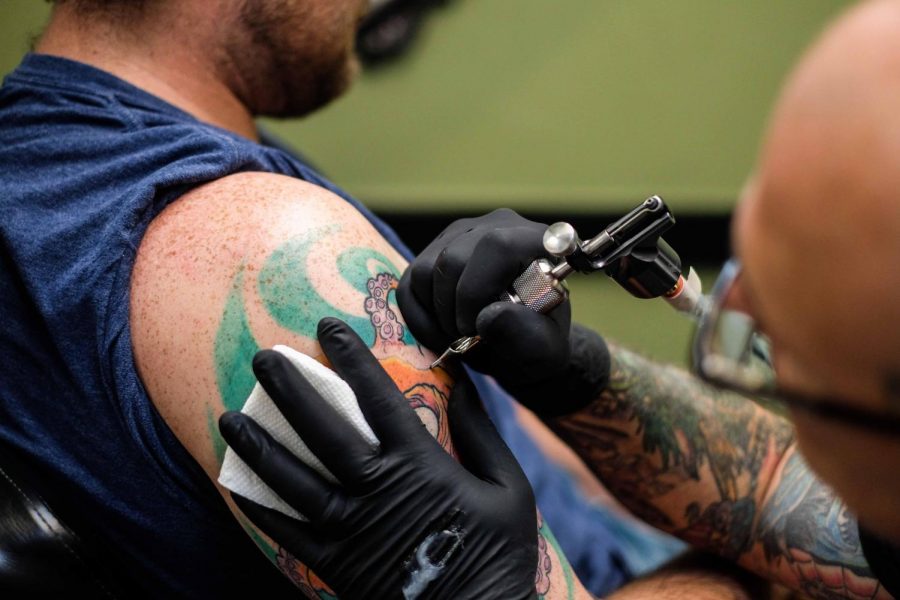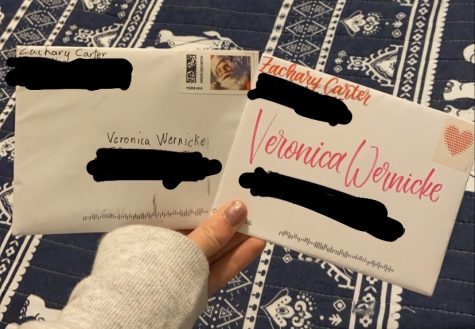Why is tattoo ink not regulated by the federal government?
I grew up surrounded by tattoos, with my dad, grandpa and several other family members showcasing their body art throughout my life. During my senior year of high school, 2016–2017, there was a spurt in people getting inked, and me being me, I was not going to join in that trend, despite having always wanted one.
Even our society has become more accepting of tattoos and the people who have them.
According to research from the Pew Research Center in 2010, 40 percent of people ages 18 to 29 have a tattoo. The same percentage of 40- and 54-year-olds also have tattoos, according to the same study. I know I personally see several people, especially on UNC Wilmington’s campus, with tattoos on a daily basis.
That is a good chunk of our populous that sports a tattoo.
Although, with any needle that punctures the skin, especially with ink, there can be some health and or safety issues.
Like I mentioned above, I have always contemplated getting a tattoo, but I have waited because I wanted to be exactly sure about the design I wanted because it is a very important and permanent decision to make.
CNN recently reported that—unbeknownst to me—“tattoo ink is not regulated by the federal government. And oversight of tattoo parlors and artists on the state and local level is spotty.”
Due to this unregulation on a government level, cosmic or tattoo artists in various states are not required to be certified or licensed—Nevada being one without any laws according to The National Conference of State Legislatures (NCSL).
Meanwhile, states that do require these things are not very strict because there are even fewer inspectors, according to the same CNN article.
The NCSL allows people to search their state’s laws on Tattooing and Body Piercing on their Tattooing and Body Piercing | State Laws, Statutes and Regulations page.
North Carolina, for instance, is a state that requires artists to obtain a permit before engaging in tattooing.
The statute summary is as follows:
“Tattooing regulated. No person shall engage in tattooing without first obtaining a tattooing permit from the Department. Licensed physicians, as well as physician assistants and nurse practitioners working under the supervision of a licensed physician, who perform tattooing within the normal course of their professional practice, are exempt from the requirements of this Part.”
The statute also states that body piercings and tattooing a minor are prohibited.
Good thing North Carolina has it together; hopefully, the inspectors in the state do as well.
The North Carolina Department of Health and Human Services (NCDHHS) website does have a section about tattoo programs.
“The Tattoo Program assures the safety of tattooing by establishing sanitation and infection control procedures tattoo artists and permanent color technologists must follow to maintain a Tattooing Permit issued by the Department through local health departments,” the website says.
And according to their website, permits are only valid for one year and thus must be annually renewed through a new inspection of tattoo shops’ “premises, instruments, utensils, equipment and procedures of the applicant.”
It does not make sense why not all states have equal regulations—or are even absent of regulations—when it comes to something like tattoos.
We have regulations and inspectors for all sorts of things like food and drugs thanks to the Food and Drug Administration (FDA).
Something like tattoo and body piercings could easily fall underneath the domain of the FDA since it already falls under the category of protecting public health.
Tattoos, specifically the inks used to apply the tattoos, have been known to cause allergic reactions like “itching, rashes or bumps, redness or irritation, skin flaking, swelling or fluid build-up around tattoo ink, scaly skin around tattoo, skin tags or nodules” as stated on Healthline.
If the FDA were to take on the regulation of tattoo ink then we might not see as many allergic or other server reactions from tattoos. They already regulate cosmetics such as “color additives found in makeup and other personal care products, skin moisturizers and cleansers, nail polish and perfume” as stated on their website.
And since the needles and ink used to apply tattoos are puncturing your skin and entering your body, you would think this would need to be something regulated on the governmental, FDA level, especially in regard to protecting public health.
It is surprising and quite concerning that tattoo ink is not regulated equally on a governmental level. Federal regulation could help hold the tattoo and body piercing industry to higher and safer standards and keep the public safe when it comes to reactions from tattoo inks.



![A map of emergency callboxes on campus. (UNCW) [hyperlink: https://uncw.maps.arcgis.com/apps/webappviewer/index.html?id=579a0e90030c4864a41c70fbe06338d9 ]](https://theseahawk.org/wp-content/uploads/2023/12/IMG_6388-600x277.png)




fitoru • Mar 19, 2020 at 7:08 pm
This one is such an informative post. I have learned a lot today.I hope to read more articles from you..